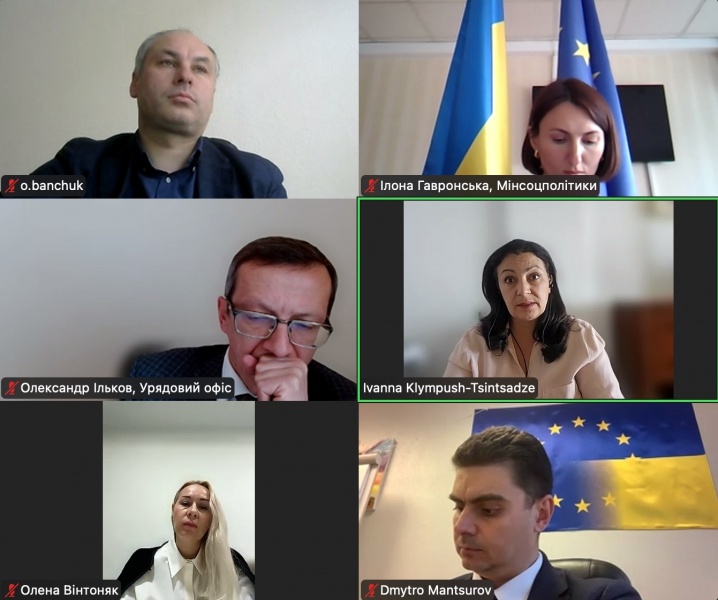
At its meeting on 1 October, the Committee on Ukraine’s Integration into the EU considered two draft laws aimed at improving the procedures for aligning Ukrainian legislation with European Union law. These are Draft Law No.13653 on Amendments to Certain Legislative Acts of Ukraine to Improve the Procedures for Aligning Ukrainian Legislation with European Union Law (EU acquis), introduced by Speaker of the Verkhovna Rada Ruslan Stefanchuk, and the alternative Draft Law No.13653-1 on Amendments to Certain Legislative Acts of Ukraine on the Procedure for Preparing, Initiating, Reviewing and Adopting EU-Integration Draft Laws, initiated by the Chair of the Committee on Ukraine’s Integration into the EU Ivanna Klympush-Tsintsadze.
Both documents propose defining the powers of the Cabinet of Ministers of Ukraine in the area of legislative alignment with EU law; ensuring coordination between the Government and Parliament in drafting EU-alignment legislation; introducing a procedure for considering such draft laws in the Verkhovna Rada; updating procedures for second or repeat second readings; and setting additional requirements for supporting documents and expert reviews.
The alternative draft law No.13653-1 also proposes defining the powers of the relevant structural units of Parliament. This would establish a clear and transparent procedure for adopting EU-integration draft laws and create safeguards against laws that might contradict Ukraine’s international obligations in the area of European integration and EU law.
The Committee Chair noted that in the alternative draft law, together with colleagues, she sought to address the gaps left in the main draft. “The main focus of the changes in the alternative draft law is to make the parliamentary procedure for working on EU-integration draft laws truly functional and effective, and not just a box-ticking exercise,” said Ivanna Klympush-Tsintsadze.
Another part of the alternative draft law No.13653-1, she added, addresses the procedures proposed by Speaker Ruslan Stefanchuk. “For example, in the main draft law the Committee has only three days from the time a draft is referred to us to issue an opinion. In practice, this turns into a formality rather than a meaningful tool within the Verkhovna Rada. Therefore, the alternative draft clarifies deadlines, along with a number of terminological improvements,” the Committee Chair explained.
She stressed that both draft laws should serve as the basis for a comprehensive legislative proposal that addresses all challenges and provides effective tools. “I am convinced that the lead committee will need to work on merging these two initiatives to create an optimal framework for ensuring efficient, high-quality and swift incorporation of EU law into Ukrainian legislation,” said Ivanna Klympush-Tsintsadze.
The Committee concluded that the alternative draft law No13653-1 is consistent with Ukraine’s international obligations in the field of European integration. The main draft law No.13653, according to the Committee, also complies with these obligations, but requires revision to address the concerns outlined in the Committee’s extended opinion.
Both documents propose defining the powers of the Cabinet of Ministers of Ukraine in the area of legislative alignment with EU law; ensuring coordination between the Government and Parliament in drafting EU-alignment legislation; introducing a procedure for considering such draft laws in the Verkhovna Rada; updating procedures for second or repeat second readings; and setting additional requirements for supporting documents and expert reviews.
The alternative draft law No.13653-1 also proposes defining the powers of the relevant structural units of Parliament. This would establish a clear and transparent procedure for adopting EU-integration draft laws and create safeguards against laws that might contradict Ukraine’s international obligations in the area of European integration and EU law.
The Committee Chair noted that in the alternative draft law, together with colleagues, she sought to address the gaps left in the main draft. “The main focus of the changes in the alternative draft law is to make the parliamentary procedure for working on EU-integration draft laws truly functional and effective, and not just a box-ticking exercise,” said Ivanna Klympush-Tsintsadze.
Another part of the alternative draft law No.13653-1, she added, addresses the procedures proposed by Speaker Ruslan Stefanchuk. “For example, in the main draft law the Committee has only three days from the time a draft is referred to us to issue an opinion. In practice, this turns into a formality rather than a meaningful tool within the Verkhovna Rada. Therefore, the alternative draft clarifies deadlines, along with a number of terminological improvements,” the Committee Chair explained.
She stressed that both draft laws should serve as the basis for a comprehensive legislative proposal that addresses all challenges and provides effective tools. “I am convinced that the lead committee will need to work on merging these two initiatives to create an optimal framework for ensuring efficient, high-quality and swift incorporation of EU law into Ukrainian legislation,” said Ivanna Klympush-Tsintsadze.
The Committee concluded that the alternative draft law No13653-1 is consistent with Ukraine’s international obligations in the field of European integration. The main draft law No.13653, according to the Committee, also complies with these obligations, but requires revision to address the concerns outlined in the Committee’s extended opinion.
More posts by topic
“News”
29 January 2026 15:00
22 January 2026 14:30
20 January 2026 13:00
18 December 2025 10:11
15 December 2025 10:07
12 December 2025 10:04
10 December 2025 10:01
04 December 2025 10:09
02 December 2025 09:58
24 November 2025 13:08